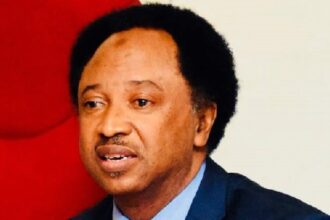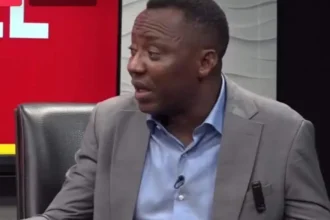We can authoritatively report that Minister of State Petroleum Resources, Dr Ibe Kachikwu has lost a bitter and acrimonious tussle for supremacy and power at the Nigerian National Petroleum Corporation (NNPC) to a Northern cabal led by First Lady, Aisha Buhari. There had been rumors and speculation about internal disputes and ethnic tensions in the NNPC between Kachikwu and NNPC group Managing Director, Maikanti Kacalla Baru. NNPC sources who elected anonymity told us that the cold war is now over as President Buhari has sided with the northern cabal who have muzzled Kachikwu out of the commanding heights of authority in decision-making on Nigeria’s oil industry.
It seemed a new day had dawned on NNPC, after Kachikwu became the first boss of the agency under Buhari. But, in reality, Kachikwu, who doubles as NNPC Board chairman has been embroiled in bitter power struggles with a northern cabal, who saw Kachikwu as standing in the way of their ambitions. NNPC sources confided to us that the northern clique; some of them with very close ties to the first lady had pressured Buhari to appoint Baru to head the NNPC, but Buhari refused. Despite the pressure, Baru was elbowed aside by Kachikwu; he landed the job of NNPC’s exploration and production chief answering to Kachikwu.
Aso Rock sources told Society Reporters that Kachikwu owed his appointment as NNPC boss to one of Buhari’s closest associates, former defence minister, Gen. Theophilus Yakubu Danjuma, who convinced Buhari that the optics of appointing Kachikwu, who hails from the oil-rich Niger Delta, will forestall any renewed violence in the region by militants still angry following the defeat of President Jonathan. In the event, the Aso Rock sources hinted, Kachikwu was “closely watched” by northerners including Buhari’s chief of staff, Abba Kyari; Mahmoud Isa-Dutse, Secretary General at the Finance Ministry, and Tajudeen Umar, a close confidante of Lamido Sanusi, the Emir of Kano and former CBN governor.
The Trojan horse
After failing to get Baru appointed NNPC boss, the northern cabal who were hell bent on maintaining control over Nigeria’s oil resources made a strategic retreat and plotted their next move. As oil prices plunged and the Nigerian economy headed into a recession, the cabal worked tirelessly behind the scenes to perpetrate hoarding to create artificial fuel scarcity to portray Kachikwu as incompetent. After that strategy failed to produce the intended results, the cabal enlisted the support of the first lady, Aisha Buhari, who used her position as the president’s wife to get Baru elected NNPC boss last August. Prior to his appointment Baru had languished as a senior adviser to Kachikwu, NNPC boss at the time.
With Aisha Buhari having his back, Baru decided to savor his ascendancy over NNPC by flexing his muscles. With little or no love lost between them, Kachikwu moved to clip his wings before he takes flight. Thus the chess game of power relations within Nigeria’s oil sector became enmeshed into Baru’s confrontation with Kachikwu, leading to a stand-off over who was the boss when it comes to oil matters. Neither men are allies Buhari can afford to do without, but Buhari eventually bowed to pressure from his constituency and threw Kachikwu under the bus. Baru, who hails from Bauchi, now calls all the shots at NNPC, and reports directly to the president; the de facto oil minister. In the meantime, Kachikwu as Petroleum Minister of state, and NNPC Board Chairman, has been reduced to a mere spectator with no powers to direct and exercise supervisory authority over NNPC activities.
The northern cabal completed their takeover of the oil sector following the recent appointments of Dr. Bello Aliyu Gusau and Alhaji Ahmed Bobboi as executive secretary of the Petroleum Technology Development Fund (PTDF) and the Petroleum Equalization Fund (PEF) respectively.
Kachikwu’s Star Wanes
We learnt from NNPC sources that the pressure to throw Kachikwu under the bus was mounted by the first lady. Nigerians might not have been aware of the underlying factors that pushed First Lady Aisha Buhari to go public, threatening in an interview with the BBC that she would not support her husband’s re-election bid come 2019. She had earlier bemoaned the absence of “change” elements in her husband’s government. Aso Rock sources told us that the “strangers” Aisha Buhari was ranting against included Kachikwu, who she metaphorically contrasted with a situation in which “monkey dey work and baboon dey chop”. In this case, the proverbial monkey (northerners) worked hard to elect Buhari president, but the baboon (Kachikwu) is mindlessly reaping the fruits to the chagrin of the apostles of change and their hangers-on. We also learnt that, it was only after Buhari sided with Baru and the northern cabal that the first lady reversed herself and promised she will support her husband’s re-election bid come 2019.
The power struggle between Baru and the technocrats led by Kachikwu has exposed the NNPC as an agency riven by internal disputes and ethnic tensions. Aso Rock sources also tell us that Kachikwu losing influence in oil affairs to the northern elite has political implications for his home region, the Niger Delta. Kachikwu, the sources aver, has been instrumental in establishing contact and negotiating with the Niger Delta Avengers (NDA) that has been vandalizing oil pipelines in the area since February. Working behind the scenes, Kachikwu, who has close ties to the oil majors, has been the arrowhead of tortuous negotiations between the federal government and Niger Delta militants towards some sort of deal that will include revamping the amnesty program for ex-militants, reduce the military presence in the region, clean up pollution; a greater share of oil revenue and also the construction of a maritime university in Gbaramatu kingdom.
“Operation Crocodile Smile”
Politically sensitive and combustible, Kachikwu’s peace overtures to the NDA was brushed aside by northerners within the military espousing a harder line. The security-minded northerners around Buhari, notably National Security Adviser (NSA), Babagana Monguno, and Army Chief of Staff, Lt. Gen. Tukur Buratai, who both hail Borno; and the Director of State Security Service (DSS) Lawal Musa Daura, all prefer a military response including overwhelming force to neutralize the NDA while pretending publicly that they are negotiating a peaceful solution. Last September, Defence Minister Mohammed Mansur Dan-Ali presided over what was advertised as a “military drill” dubbed “Operation Crocodile Smile” involving 10,000 soldiers, including Special Forces, in Bayelsa State. “It’s not to harass, intimidate or threaten the community but to protect them from miscreants and oil thieves,” Dan-Ali said at the closing ceremony; but it was a clear signal that Buhari is talking peace while preparing for war.
Since the Avengers announced a unilateral ceasefire on August 20, ostensibly to give negotiations a chance, the government has been quiet about its strategy. The Avengers appointed Chief Edwin Clark, the veteran Ijaw leader and advisor to former president Jonathan, as leader of their negotiating team. Clark made 16 demands to the Nigerian government during a meeting with Kachikwu and President Buhari last Tuesday; warning that other militant groups are proliferating alongside the Avengers and would deepen the crisis if the government didn’t act quickly on the demands.
Yet, senior military officers, most of them northerners, argue that the military can defeat the militants with a smarter strategy. They point to an operation by Special Forces in which five militants were killed and two were arrested. But Kachikwu and the oil majors are more skeptical. Past experience suggests it would take a protracted heavy-handed military campaign, and more damage to oil installations, to defeat the new militant groups, who are more skilled and resilient than their MEND predecessors; they use deep-sea divers to attack far-flung pipelines and geo-positioning technology to escape capture.
We understands that the Gbaramatu Peninsula neighbors Exxon’s oil and gas-gathering facility and export terminal, and is a trunk route for the West African Gas Pipeline, which originates at Escravos and runs to Ghana. It’s also within striking range of Shell’s Forcados export terminal, which the NDA attacked on February 14 in a spectacular and highly technical operation, bombing its underwater pipeline. It took seven months for the pipeline, which carries 400,000 bpd to the Forcados Export Terminal, to be operational. According to sources close to Shell, 250,000-300,000 bpd was lost over seven months, at an average price of $45 per barrel, amounting to a colossal loss to Shell of $3 billion. Meanwhile, an oil industry expert told us that the stranglehold exercised by northerners like Baru at the NNPC will lead to corporate paralysis. He expressed bitter disappointment with the president for giving in to the pressure of his wife and the northern cabal, saying Baru’s appointment as NNPC boss has installed the “culture of incompetence, political opportunism, graft, brigandage, self-centeredness, insensitivity, impunity, mediocrity and greed.” The source said prior to Kachikwu’s appointment, NNPC was bankrupt and oil majors often had to acrobatically invent ways to lend money to NNPC in return for a share of crude that would normally go to the state.
The move to open NNPC’s doors last year to executives from the private sector like Kachikwu (ex- ExxonMobil) and NNPC legal advisor Chidi Momah (ex-Total ) breathe some new life into the NNPC as Kachikwu had begun finding solutions to the NNPC’s chronic shortage of cash, which hobbles its joint-ventures with the oil majors. Presently, NNPC must finance 55% of development costs on all joint-ventures it operates with Shell , ExxonMobil, Chevron , Total and ENI . It remains to be seen whether with Kachikwu now a spectator, the oil majors will keep the tap open for Baru and his northern clique.
Source: huhuonline









